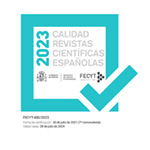The Institutional Response to the COVID-19 Crisis in the City of Valencia: Perceptions of Key Actors about the Implemented Processes of Governance
Abstract
The COVID-19 epidemic has had a significant multidimensional impact due to its farreaching social and economic consequences. In Western democracies, social actors – particularly politicians, both governmental and non-governmental – have had to adjust their conduct and strategies to face an unprecedented challenge. This article analyses innovative responses to the crisis in urban policies adopted in the city of Valencia (Spain). Special attention is given to social, economic, political and governance innovation programs. We try to identify public actions, programs and projects developed in the context of the pandemic and assess the changes and continuities in the urban policy institutional environment. Adopting a public policy analysis approach within the framework of the new democratic governance approaches, and relying on a qualitative methodology (interviews with political and technical officials and document analysis), attention is focused on the actions and results in terms of strengthening the associative fabric, the participatory processes developed, the public-private coproduction of public services and, in general, the governance processes implemented. The final objective is to draw normative conclusions that help to generalize good innovation practices at local governmental levels.
Downloads
Article download
License
In order to support the global exchange of knowledge, the journal Geopolítica (s) Revista de estudios sobre espacio y poder is allowing unrestricted access to its content as from its publication in this electronic edition, and as such it is an open-access journal. The originals published in this journal are the property of the Complutense University of Madrid and any reproduction thereof in full or in part must cite the source. All content is distributed under a Creative Commons Attribution 4.0 use and distribution licence (CC BY 4.0). This circumstance must be expressly stated in these terms where necessary. You can view the summary and the complete legal text of the licence.









